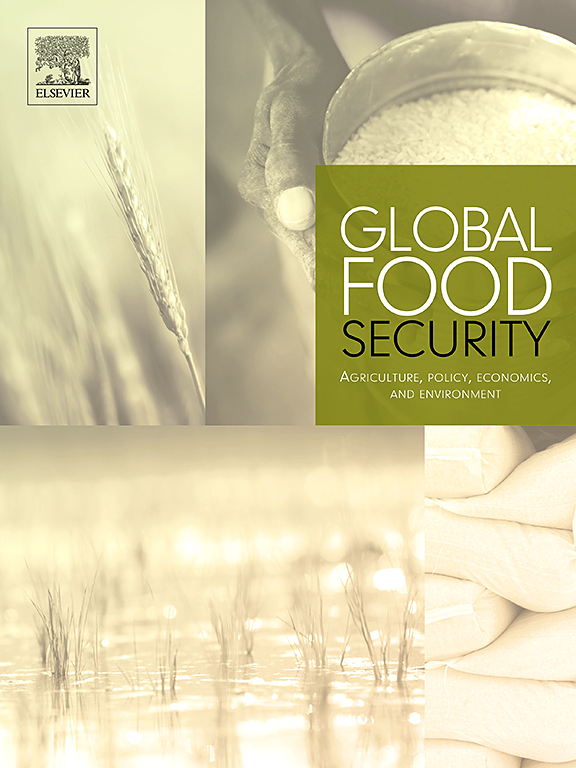Farming for the future: Understanding factors enabling the adoption of diversified farming systems
IF 9.6
1区 经济学
Q1 FOOD SCIENCE & TECHNOLOGY
Global Food Security-Agriculture Policy Economics and Environment
Pub Date : 2024-12-01
DOI:10.1016/j.gfs.2024.100820
引用次数: 0
Abstract
Diversified farming practices offer a promising pathway to sustainable food production by providing economic, environmental, and social benefits to farmers and society. However, the factors influencing their adoption are poorly understood, hindering the development of effective promotion strategies.
This study presents a comprehensive global meta-analysis of 154 peer-reviewed studies analysing factors influencing adoption. We examined the effects of 71 factors across nine key categories—biophysical context, farm management characteristics, farmers’ attitudes, political and institutional context (access to knowledge, land tenure, financial risk management), and five forms of capital (financial, human, natural, physical, and social)—on the adoption of ten diversified practices in 42 countries across five UN regions.
Our results reveal that access to knowledge, social capital, and farmers’ attitudes are key enablers of adoption, surpassing financial, physical, human, and natural capital. Specifically, access to extension services, strong social networks, and perceived environmental benefits significantly correlate with adoption. Land ownership, household income, literacy levels, and shallow soils have smaller positive effects. The influence of these factors varies across practices and geographic contexts, highlighting the complex and multifaceted nature of adoption.
These findings emphasize the need for holistic agricultural initiatives and policies to promote the adoption of sustainable practices. Strategies that build technical knowledge and social capital and that are tailored to local contexts, sociocultural norms, and market structures, considering farmers' perceptions and attitudes through codesign processes, are more likely to succeed. Adaptive and context-specific strategies are crucial for fostering the widespread adoption of diversified farming practices and a more sustainable agricultural future.

面向未来的农业:了解能够采用多样化农业系统的因素
多样化耕作方式为农民和社会带来经济、环境和社会效益,为可持续粮食生产提供了一条有希望的途径。然而,人们对影响其采用的因素了解甚少,从而阻碍了有效推广策略的制定。本研究对154项同行评议的研究进行了全面的全球荟萃分析,分析了影响采用的因素。我们研究了9个关键类别的71个因素——生物物理环境、农场管理特征、农民态度、政治和制度环境(获取知识、土地权属、金融风险管理)和5种资本形式(金融、人力、自然、物质和社会)——对联合国5个区域42个国家采用10种多样化做法的影响。我们的研究结果表明,获得知识、社会资本和农民的态度是推动采用的关键因素,超过了金融、物质、人力和自然资本。具体来说,获得扩展服务、强大的社会网络和感知到的环境效益与采用显著相关。土地所有权、家庭收入、文化水平和浅层土壤的积极影响较小。这些因素的影响因做法和地理环境而异,突出了收养的复杂性和多面性。这些调查结果强调需要采取全面的农业举措和政策,以促进采用可持续做法。建立技术知识和社会资本并根据当地情况、社会文化规范和市场结构量身定制的战略,通过共同设计过程考虑农民的看法和态度,更有可能取得成功。适应性和因地制宜的战略对于促进广泛采用多样化耕作方式和更可持续的农业未来至关重要。
本文章由计算机程序翻译,如有差异,请以英文原文为准。
求助全文
约1分钟内获得全文
求助全文
来源期刊

Global Food Security-Agriculture Policy Economics and Environment
FOOD SCIENCE & TECHNOLOGY-
CiteScore
20.90
自引率
3.40%
发文量
69
期刊介绍:
Global Food Security plays a vital role in addressing food security challenges from local to global levels. To secure food systems, it emphasizes multifaceted actions considering technological, biophysical, institutional, economic, social, and political factors. The goal is to foster food systems that meet nutritional needs, preserve the environment, support livelihoods, tackle climate change, and diminish inequalities. This journal serves as a platform for researchers, policymakers, and practitioners to access and engage with recent, diverse research and perspectives on achieving sustainable food security globally. It aspires to be an internationally recognized resource presenting cutting-edge insights in an accessible manner to a broad audience.
 求助内容:
求助内容: 应助结果提醒方式:
应助结果提醒方式:


